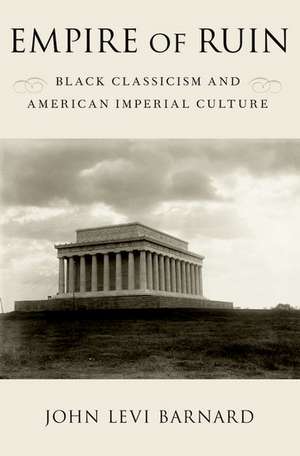Empire of Ruin: Black Classicism and American Imperial Culture
Autor John Levi Barnarden Limba Engleză Paperback – iun 2022
| Toate formatele și edițiile | Preț | Express |
|---|---|---|
| Paperback (1) | 313.93 lei 3-5 săpt. | |
| Oxford University Press – iun 2022 | 313.93 lei 3-5 săpt. | |
| Hardback (1) | 533.32 lei 32-37 zile | |
| Oxford University Press – 16 noi 2017 | 533.32 lei 32-37 zile |
Preț: 313.93 lei
Nou
Puncte Express: 471
Preț estimativ în valută:
60.07€ • 64.24$ • 50.09£
60.07€ • 64.24$ • 50.09£
Carte disponibilă
Livrare economică 27 martie-10 aprilie
Preluare comenzi: 021 569.72.76
Specificații
ISBN-13: 9780197635100
ISBN-10: 0197635105
Pagini: 248
Dimensiuni: 239 x 155 x 25 mm
Greutate: 0.5 kg
Editura: Oxford University Press
Colecția OUP USA
Locul publicării:New York, United States
ISBN-10: 0197635105
Pagini: 248
Dimensiuni: 239 x 155 x 25 mm
Greutate: 0.5 kg
Editura: Oxford University Press
Colecția OUP USA
Locul publicării:New York, United States
Recenzii
Honorable Mention for the 2018 MLA William Sanders Scarborough Prize
This is a brilliant study of power in the US. ... Summing Up: Essential. Upper-division undergraduates through faculty.
John Levi Barnard's Empire of Ruin is an exhaustively researched, tightly woven analysis that takes scholarship on black classism in a fresh, original direction. He demonstrates how African American writers from the Revolution through the civil rights era and beyond have exposed the central role of the classical tradition in supporting slavery and creating oppressive narratives of national and racial identity. An expert study of the politics of culture and the ongoing vision of African American literature and liberation, this book is required reading for specialists in American Literature, African American Studies, Cultural Studies, Rhetoric, and Public History. In the ruins of the classical past, as this book hauntingly presents, rest meanings that continue to haunt and divide our present times.
Barnard deftly illuminates how figures such as Phillis Wheatley, William Wells Brown, and Charles Chestnut, among others, summoned classical resonances to occasion a critique of the intertwined discourses in the U.S. about democracy, imperialism, and racial formation throughout the long nineteenth century. Over a series of acute and elegant readings, Barnard's book as a whole serves as a trenchant intervention in the still ongoing debates about race and Western modernity, not only the latter's formation but its continued expansion, and a necessary reminder of how black cultural producers have reinvented the ruins of empire into monuments and testimonies of freedom. ... [it] rewards its readers by compelling a reassessment of some of the central lines of critical inquiry of African American Studies and Classics, equally for where they intersect as where they diverge, to reveal how both fields are committed to animating ... the promise of humanism.
This lucid and deeply learned book forces us to reconsider the cultural work of classicism; it also announces the arrival of an important new critic. Working across centuries, cultures, and canons, John Levi Barnard offers a series of bravura readings that grant coherence and urgency to a heretofore understudied African American cultural tradition. Barnard's deft discussion of Phillis Wheatley, Charles Chesnutt, and Kara Walker, among others, reveals their withering critiques of American imperialism and white supremacist idealogy.
This is a brilliant study of power in the US. ... Summing Up: Essential. Upper-division undergraduates through faculty.
John Levi Barnard's Empire of Ruin is an exhaustively researched, tightly woven analysis that takes scholarship on black classism in a fresh, original direction. He demonstrates how African American writers from the Revolution through the civil rights era and beyond have exposed the central role of the classical tradition in supporting slavery and creating oppressive narratives of national and racial identity. An expert study of the politics of culture and the ongoing vision of African American literature and liberation, this book is required reading for specialists in American Literature, African American Studies, Cultural Studies, Rhetoric, and Public History. In the ruins of the classical past, as this book hauntingly presents, rest meanings that continue to haunt and divide our present times.
Barnard deftly illuminates how figures such as Phillis Wheatley, William Wells Brown, and Charles Chestnut, among others, summoned classical resonances to occasion a critique of the intertwined discourses in the U.S. about democracy, imperialism, and racial formation throughout the long nineteenth century. Over a series of acute and elegant readings, Barnard's book as a whole serves as a trenchant intervention in the still ongoing debates about race and Western modernity, not only the latter's formation but its continued expansion, and a necessary reminder of how black cultural producers have reinvented the ruins of empire into monuments and testimonies of freedom. ... [it] rewards its readers by compelling a reassessment of some of the central lines of critical inquiry of African American Studies and Classics, equally for where they intersect as where they diverge, to reveal how both fields are committed to animating ... the promise of humanism.
This lucid and deeply learned book forces us to reconsider the cultural work of classicism; it also announces the arrival of an important new critic. Working across centuries, cultures, and canons, John Levi Barnard offers a series of bravura readings that grant coherence and urgency to a heretofore understudied African American cultural tradition. Barnard's deft discussion of Phillis Wheatley, Charles Chesnutt, and Kara Walker, among others, reveals their withering critiques of American imperialism and white supremacist idealogy.
Notă biografică
John Levi Barnard is an Associate Professor of English and Comparative and World Literature at the University of Illinois at Urbana-Champaign.
